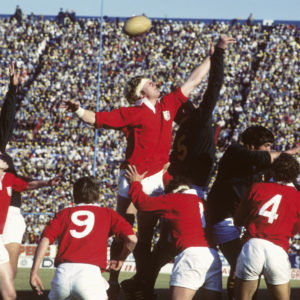Elite athletes struggle with mental health
Sport has brought hope and joy to many during the pandemic. But as athletes entertain us, their own challenges of neverending bio bubbles and performing as if nothing is wrong are being overlooked.
Author:
6 October 2021

The British and Irish Lions’ clash with rugby world champions the Springboks may have lacked the usual wall of noise from its backing choir in the stands, but it was a timely reminder of the special place sport holds in many people’s lives.
“Sport is incredibly emotive, and it gives us a sense of community and belonging,” explained sports psychologist Kirsten van Heerden. For many, sport is a tonic. It offers an escape from the pressures of daily life, one in which dreams take flight and a different energy courses through one’s veins.
“It is entertainment, of course, but it is much bigger than that. To have it taken away was very difficult for many people,” Van Heerden continued.
There are fans who make untold sacrifices to follow their teams and favourite athletes to the ends of the Earth, unflinchingly supporting those who bring joy to their lives. And the Lions series has many of these superfans, people who save for years to watch iconic events in person with like-minded supporters.
65900:
On the back of an incredible 2009 Lions series, and then a 2019 Rugby World Cup in which South Africa overcame both Wales and England on their way to their Yokohama coronation, the next Lions series against the Springboks was supposed to be an explosion of passion and pride.
And then the world changed.
It was dubbed the series that wasn’t supposed to happen, playing out against a backdrop of travel uncertainty, constantly changing logistics, unrest and a pandemic from whose clutches the world still has not nearly escaped. With so many global sporting events postponed or shifted to more predictable environments, there was intense speculation that the series would take place elsewhere.
But somehow, it didn’t. And for three weeks, across time zones and mounting tension on and off the field, the series played out and provided a routine and rhythm for those who hold it dear.
Finding a way
“In a way, 2020 was almost easier to deal with,” said Van Heerden. “There was just no sport, so we were all in the same boat. 2021 has been harder for athletes to deal with, because some countries are ahead of others.”
Bio bubbles, protocols and isolation have become familiar buzzwords as the world looks to carry on, wave after wave. More has been asked of athletes and their mentality, with Van Heerden seeing a sharp rise in the number of athletes dealing with mental health and wellbeing issues.
“For a long time, people associated mental health with toughness. It was showing weakness to talk about it, so many didn’t,” she said. But in the past 18 months in particular, a number of prominent athletes have spoken publicly about their mental health, highlighting what many struggled with in silence and shame before.
Tennis star Naomi Osaka, gymnast genius Simone Biles, swimming legend Michael Phelps and cricketer Ben Stokes are just a handful of superstars who have publicly laid bare their challenges and then stepped away from the elite competition by which the world had come to define them.
Related article:
“It is great that they have been so honest and open about this. These are some of the biggest names in sport,” said Van Heerden. “You can’t say that Michael Phelps, the most decorated Olympian of all time, is not mentally tough. Simone Biles is absolutely incredible, so for her to feel how she feels tells us how incredibly tough it really is.”
The same can be said of Stokes, who has provided the punctuation mark to some of modern cricket’s most iconic moments. Like the 2019 ICC Men’s Cricket World Cup final, when he stood alone like a gladiator, hauling England to their first-ever triumph.
Or the Ashes Test at Headingley in the same year, when he riotously rewrote the last rites with last batsman Jack Leach, thumping the winning boundary to the soundtrack of English euphoria. To question his mental fortitude, then, would be a folly.
Yet Stokes has asked for time away from the game, citing mental health as one of his concerns. “It is okay not to be okay,” said Van Heerden.
‘Toughen up’
It sounds simple enough, but it has often been rubbished in the media and on social media when elite athletes cite anxiety, mental wellness or something else that is not as glaringly obvious as a physical injury. “Performance cannot be the only indicator,” said Van Heerden. The ability to still score runs, execute intricate routines and break records must not mask the mental challenges that may be torturing some of the world’s best athletes.
Most aspiring athletes are told to “toughen up” or suck it up when they bring up mental issues, which only adds to their anxiety levels. Some try to shelve the issue temporarily and soldier on, but the damage is done.
During the pandemic, some athletes have withdrawn from tours or events that require them to live in extended isolation from their families, because the anxiety created by that rigid way of life is not something they want to go through.
Related article:
Sport is constantly evolving to protect human bodies. Motor racing consistently seeks ways to give competitors a better chance of walking away from the inevitable accidents, and the protocol around head injuries in contact sports has evolved.
Helmets, halos, protective padding and other equipment help minimise the risks that sport places on athletes’ bodies. In comparison, the focus on mental health has been in the slow lane.
“There is still a lack of education about mental wellness. Often, when we talk about mental health, a lot of people come to me afterwards and say, ‘I went through something like that a while back,’ or ‘I was depressed.’”
Online abuse
There is an unrealistic expectation for elite athletes to simply cope with unrealistic expectations of their time and talent – and still be relatable, as many live vicariously through them.
Now – as mental health in sport becomes a more common talking point, championed by those whose voices reach places far beyond the sports arenas they dominate – constructive conversations are being had about how to deal best with these unique challenges.
Related article:
The gift and curse that is social media can also be part of the harm. As the global pandemic continues to force athletes to spend extended periods of time alone, it is inevitable that they interact more with the virtual communities in which their brands thrive. But for all the support and encouragement, trolling and worse also lives and thrives in the world most athletes enter to get closer to their fans.
Online abuse, particularly after sporting shortcomings, can quickly turn sinister. These are all the minefields that the world’s leading athletes navigate, while simultaneously trying to perform at their best.
The reaction of the fans
At its essence, sport is an optimistic endeavour. It’s a communal shot at glory and joy, rich with nuance, narrative and the nourishing euphoria of a mob moved by talent and tenacity. It changes lives, lifting men and women into worlds they could not have imagined when growing up.
That’s the top side of the coin. On the underside, however, is the damage sport can do when it doesn’t end well. It leaves athletes at the mercy of those who feel the sense of loss, but are also compelled to find a scapegoat.
In normal times, a lot of that angst is unleashed in the stadium. Watch an English Premier League match, paying particular attention to the crowd: young or old, they kick every ball; delirious one moment, devastated the next.
The source of those emotions – and thus the target of their jubilation or ire – is on the field, trying their best. Sunderland ’Til I Die is a Netflix documentary series that showcases the torture these archetypes go through. It’s a gripping window into the world of a club battling for survival.
Related article:
Tumbling from the Premiership, through the Championship and into the third tier of English football, the club from the northeast of England takes its fans to the edge of despair. And yet those fans gather every match day, praying and baying for a change in the wind. It’s a soap opera, only in real life.
The Springboks and Lions played out a drama series of their own, laden with Machiavellian controversy, weekly intrigue and an unflinching physical sincerity. There was no green or red crowd at the Cape Town Stadium, but there was plenty of tribal, primal screaming at the action from afar.
That is the irresistible pull of sport. It’s a routine, dictating the rhythm of communities desperate for hope – and often a means to cope.





